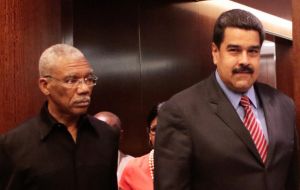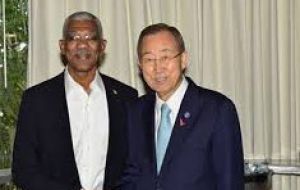MercoPress. South Atlantic News Agency
Venezuela warns Canada over mining activities in Guyana: 'infringing on territorial sovereignty'
 Venezuela issued a warning letter to Guyana Goldfields Incorporated, informing that its operations are “infringing on the territorial sovereignty of Venezuela”.
Venezuela issued a warning letter to Guyana Goldfields Incorporated, informing that its operations are “infringing on the territorial sovereignty of Venezuela”.  The development comes a month after Granger and Venezuela's Maduro agreed to work to resolve the issues in the border dispute between the two neighbors.
The development comes a month after Granger and Venezuela's Maduro agreed to work to resolve the issues in the border dispute between the two neighbors.  Guyana is currently awaiting the report of the UN Mission; Granger expressed his full confidence in the capacity of Secretary General Ban Ki-moon
Guyana is currently awaiting the report of the UN Mission; Granger expressed his full confidence in the capacity of Secretary General Ban Ki-moon Venezuela has objected to a Canadian mining company operating in Guyana, telling the company it is infringing on Caracas’ sovereignty. And the move has not gone down well with Guyana’s president David Granger.
Granger told Parliament that, in a move that shows no regard for diplomacy, Venezuela’s Ambassador to Ottawa, Canada had issued a warning letter to Guyana Goldfields Incorporated, informing that its operations are “infringing on the territorial sovereignty of Venezuela”.
Guyana Goldfields has a mining operation in the Cuyuni-Mazaruni Region.
The development comes a month after Granger and his Venezuelan counterpart Nicolás Maduro agreed to work to resolve the issues in the border dispute between the two neighbors.
“Venezuela’s claims are not only illegal; they are injurious to the economic development of Guyana. Venezuela, therefore, must desist from hindering our economic development in an obtrusive and obstructive manner that is tantamount to interference in our internal affairs. It must desist from threatening investors,” Granger said.
He questioned whether Venezuelan leaders derived satisfaction from the prolongation of this controversy and said that, unlike Venezuela, Guyana has always been respectful to the governments and people of neighboring states.
“Venezuela’s fear is that, once a juridical process could prove that its contention that the Arbitral Award of 1899 was a nullity is proven to be baseless, its 50-year strategy of attrition, aimed at gaining territory from Guyana, stands in jeopardy of the prospect of collapse,” the president added, noting that Guyana favours a juridical settlement through recourse to the International Court of Justice.
Guyana is currently awaiting the report of the UN Mission that visited both Guyana and Venezuela earlier this month and President Granger expressed his full confidence in the capacity of Secretary General Ban Ki-moon to identify solutions that will validate the nature of the Arbitral Tribunal Award of 1899.
More recently, Guyana’s eastern neighbor, Suriname, has renewed its interest in the New River Triangle area. Granger said there is an agreement as to what constitutes the territory of Guyana and that of Suriname. However, in the absence of a formal treaty, the Dutch country has sought to seize Guyana’s territory.
Granger said that while Guyana is willing to continue a bilateral discourse with the Government of Suriname on this matter, such discourse must be grounded on the principles of mutual respect and a repudiation of the use of force.
“Guyana has no doubt about the soundness of the bases on which it exercises sovereignty of its territory. It has no fear in having Suriname’s claim to its territory resolved by an adjudicatory process,” he said.
The president said Guyana has already made a large portion of its documents available to Suriname for scrutiny and expressed the hope that the Suriname government would do likewise, by requesting the Netherlands government to open the relevant Dutch archives to facilitate research by both sides.
“Suriname, if it is convinced that its claim can withstand legal scrutiny, should agree to take the matter before an internationally recognized adjudicatory body. Guyana is of the view that, if an agreement cannot be reached at the bilateral level, within a given time-frame, the matter should be taken to adjudication so that this controversy can be concluded,” Granger said.
The Guyanese leader insisted that his country would continue to work with both Venezuela and Suriname to make the region a more peaceful, prosperous place and to pursue cooperation arrangements, but not to the detriment of its territorial integrity and sovereignty.
“As far as Guyana is concerned, the border takes first place,” he declared.




Top Comments
Disclaimer & comment rules-

-

-

Read all commentsNothing like a bogus international dispute to take the minds of your people off their domestic problems
Oct 28th, 2015 - 01:39 pm 01 Pontefractious (#)
Oct 28th, 2015 - 01:55 pm 0Yeah, funny that.
I wonder where else in South America this might happen.
If Guyana asks the Commonwealth or UK directly for help,
It might be worth mentioning their lack of support for the Falkland Islanders.
@2. Interesting. Perhaps the Royal Canadian Navy vs Venezuelan Navy? The RCN is more capable.
Oct 28th, 2015 - 02:26 pm 0But I agree about their lack of support for the Falkland Islanders. So, we have a little Commonwealth country under threat from the east and west. So? They made their bed.
Commenting for this story is now closed.
If you have a Facebook account, become a fan and comment on our Facebook Page!